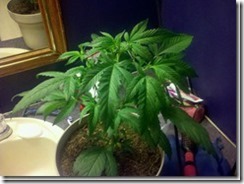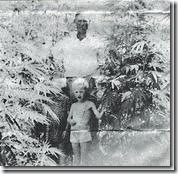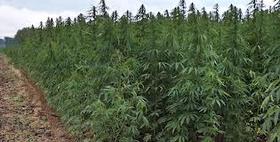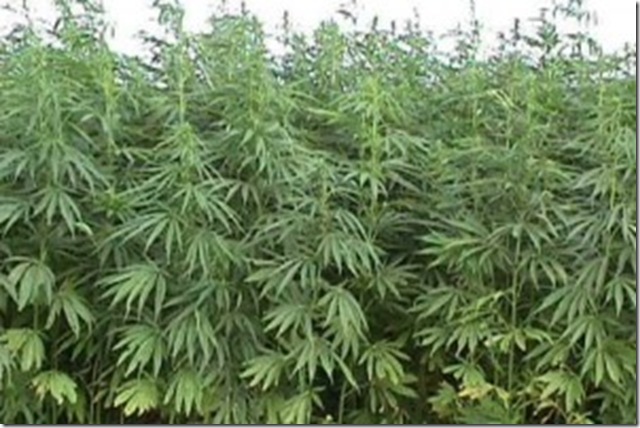 In 1996 the actor Woody Harrelson, who has a sideline as an activist for legalizing marijuana, was arrested in Kentucky for planting four hemp seeds. Last month Senator Mitch McConnell, the Republican minority leader, announced his support for growing hemp in Kentucky, his home state.
In 1996 the actor Woody Harrelson, who has a sideline as an activist for legalizing marijuana, was arrested in Kentucky for planting four hemp seeds. Last month Senator Mitch McConnell, the Republican minority leader, announced his support for growing hemp in Kentucky, his home state.
Between those jarringly disparate events lies the evolution of hemp from a countercultural cause to an issue championed by farmers in the heartland and conservative lawmakers.
On Monday, a panel of the Republican-controlled Kentucky State Senate unanimously approved a bill to license hemp growers. It was promoted by the state agriculture commissioner and three members of the state’s Congressional delegation, including Senator Rand Paul, who removed his jacket to testify in a white shirt that he announced was made of hemp fibers.
If the bill is approved by the full Legislature, Kentucky will join eight other states that have adopted laws to allow commercial hemp growing, although the practice is effectively blocked by federal law that makes no distinction between hemp and marijuana.
Mr. Paul, a Republican, said he would seek a waiver from the Obama administration for Kentucky hemp growers, while pressing Congress to delist hemp as a controlled substance, which hemp supporters say is a legacy of antidrug hysteria.
Both plants are the same species, Cannabis sativa, but hemp has only a trace of the psychoactive ingredient in marijuana. Hemp’s champions see it as a source of agricultural jobs, an alternative for struggling tobacco farmers and a wonder plant with uses from bluejeans to building materials.
Attitudes are changing in surprising places. At a hearing on Monday in Frankfort, the Kentucky capital, the state police commissioner’s opposition to hemp growing was challenged by a former C.I.A. director, R. James Woolsey.
“The specter of people getting high on industrial hemp,” Mr. Woolsey said, “is pretty much exactly like saying you can get drunk on O’Doul’s.”
Hemp supporters say it is only a matter of time before legalization comes as people more fully understand the plant. They also point to states where voters legalized recreational marijuana in November — Colorado and Washington — as inevitably forcing a change in priorities in the Obama administration.
“The demonology of hemp is exposed as being not valid,” said Representative John Yarmuth, Democrat of Kentucky, a sponsor of a bill in the House to allow hemp cultivation. He said the movement to accept hemp has the same inevitability that he attributed to acceptance of same-sex marriage.
Still, the federal government has been unyielding. Farmers in states that allow hemp must seek a waiver from the Drug Enforcement Administration or risk being raided by federal agents and losing their farms.
Dave Monson, a North Dakota wheat farmer and Republican state representative, has held a state hemp license since 2007, when North Dakota legalized cultivation. But he has no plans to plant. “I applied for a D.E.A. license, never got one,” he said.
A spokesman for the drug agency said it did not keep statistics on permits to grow hemp, which it does not distinguish from marijuana under the Controlled Substance Act of 1970.
Mr. Monson knows farmers just north of the Canadian border who profitably grow hemp, and he argues that it can be an economic boon. “The more states that do what we have done in North Dakota, if we can keep the pressure on, I think we’re going to see some movement at the federal level,” he said.
Hemp supporters claim a total retail value of products containing hemp at more than $400 million in the United States. But a Congressional Research Service report last year found that imported hemp raw materials was small, only $11.5 million. All hemp used in United States today — such as in Dr. Bronner’s Magic Soaps sold at Whole Foods — is imported, mostly from China.
Rodney Brewer, the commissioner of the Kentucky State Police, said that if hemp farming were legal, marijuana growers would hide their plants in hemp fields and the police could not tell them apart.
“They are identical in appearance when it comes to the naked eye,” Mr. Brewer said, predicting that legalizing hemp would create a boom for pot growers.
But Mr. Woolsey, who said he favored hemp because of “my interest in prosperity for rural America,” argued that no pot farmer would hide plants in a hemp field for fear that low-potency hemp would cross-pollinate with marijuana and lower the concentration of THC, its psychoactive ingredient.
Marijuana growers “hate the idea of having industrial hemp anywhere near,” he said.
The Kentucky bill faces resistance from some lawmakers, including the speaker of the State House.
Mr. Paul, after calling attention to his hemp shirt at the hearing in Frankfort, seemed to roll his eyes when he said, “You’d think you’re at a D.E.A. hearing.”
“This is a hearing about a crop,” he said. “It’s a crop that’s legal everywhere else in the world except the United States.”
Mr. Paul, elected in 2010 with Tea Party support, promised to introduce a Senate bill as a companion to the pro-hemp bill in the House, which has 28 co-sponsors. He is following in the family footsteps, since the first House bill allowing hemp was introduced several years ago by his father, Ron Paul, a former Texas congressman and Republican presidential candidate. Ron Paul’s embrace of the issue fit his deep libertarian streak, which also at times embraced legalizing marijuana and other drugs.
Those positions placed hemp far outside the mainstream in many lawmakers’ minds, just as the image of its products — soaps, sandals and natural foods sold at co-ops — placed it in a counterculture.
But no better sign exists that hemp’s image is changing than its embrace by Mr. McConnell, the minority leader, who said in a statement last month that his mind had been changed “after long discussions” with Rand Paul and the Kentucky agriculture commissioner, James Comer, a Republican.
“The utilization of hemp to produce everything from clothing to paper is real,” Mr. McConnell said.
A version of this article appeared in print on February 13, 2013, on page A16 of the New York edition with the headline: Hemp Growing Finds Allies of a New Stripe in Kentucky.
Source: New York Times (NY)
Author: Trip Gabriel
Published: February 13, 2013
Copyright: 2013 The New York Times Company
Contact: [email protected]
Website: http://www.nytimes.com/












